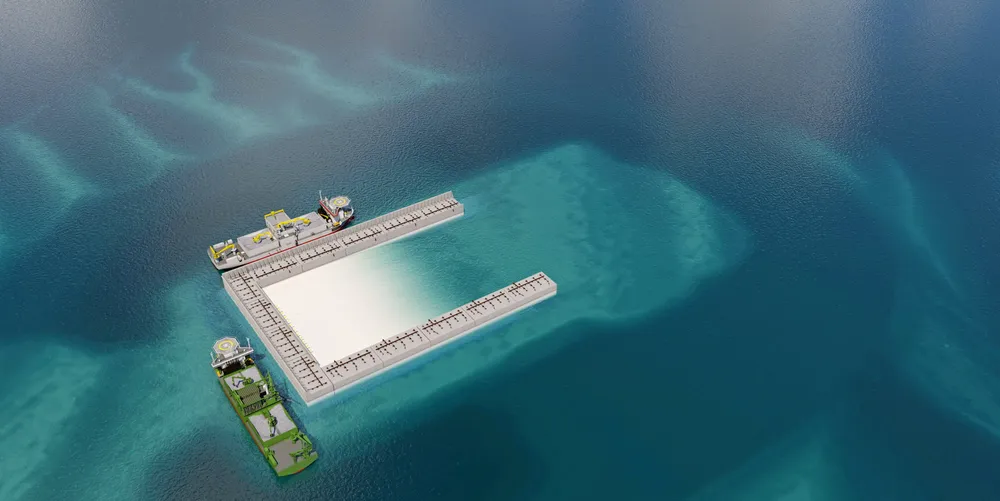World's first energy island raises sails as Elia taps DEME-Jan de Nul for turnkey job off Belgium
Giant offshore industrial base being built by TSO Elia with high voltage power systems to link nearby wind farms on to domestic as well as wider North Sea markets

Plans for the world’s first energy island – an industrial sea-base featuring high voltage power substations and an operations hub, wired in an offshore area’s wind fleet – leapt ahead today (Tuesday) with Belgian transmission system operator (TSO) Elia naming a consortium made up of the DEME and Jan de Nul groups to construct the Princess Elisabeth Island (PEI) facility.
Working under the TM Edison banner, the two contractors will take on a turnkey EPCI (engineering, procurement, construction and installation) deal to lay the foundations of PEI, a large set of concrete caissons filled with sand, as well as a small harbour and helipad to accomodate maintenance crews. Work is to start in early 2024, and installation of the power infrastructure to follow two years later.
Being built 45km off the coast of Belgium in the North Sea, the island, covering an area of six hectares, around the size of 12 soccer pitches, will serve as a transmission hub for the 3.5GW Princess Elisabeth offshore wind zone on to North Sea power markets in the UK and Denmark via the Nautilus and TritonLink interconnectors.
“Belgium has been a pioneer in offshore wind power for 15 years and is once again demonstrating its expertise today through its first energy island – which is also a world first,” Tinne Van der Straeten, Belgium’s minister of energy, said.
“Our offshore expertise is now recognised worldwide. By continuing to innovate, we are also strengthening our position for the future. We are giving our Belgian companies another chance to be true pioneers, both here and abroad. So, we are once again highlighting our country on the world map.”
Elia Group CEO Chris Peeters stated: “This project is the most cost-effective and reliable way to bring offshore wind to shore. It will be an island that provides options for the future.
“When we connect it to other countries, PEI will become the first offshore energy hub. After our construction of the first hybrid interconnector in the Baltic Sea, the island is another world first.”
Luc Vandenbulcke, CEO of DEME Group, called the flagship energy island a “technical tour de force” that would require that the “focus for TM EDISON lies in qualitative execution that involves the lowest possible carbon footprint and the rising water level of the North Sea”.
Jan de Nul director Julie De Nul said: “Belgium is a front-runner in the field of offshore wind. We are making this clear once again by constructing this energy island. The combined experience of Jan De Nul and DEME as specialists in dredging, rock armour and offshore energy is an absolute added value.”
The energy island, which will be engineered to handle both HVDC (high voltage direct current and HVAC (alternating current (HVAC) – a world first, is being seen as the “first building block” in an integrated European offshore supergrid, connecting together a network of energy islands and national power networks.
The design of the energy island is now being finalised with an eye on construction kicking off early next year, with the caissons built and installed through 2025.
Once complete, the foundation will be prepped for installation of electrical infrastructure, and then connected with newbuild Belgium wind farms during commissioning. Elia spotlighted it would “crucial” that its Ventilus and Boucle du Hainaut onshore grid reinforcement projects “were realised at the same time”, if the TSO was to meet its target having all Belgian offshore wind farms “fully connected to the mainland by 2030”.
“Belgium wants to build additional joint interconnections with Great Britain and Denmark. These will give our country access to the massive amounts of renewable energy that are needed to make our industry less dependent on fossil fuels in the short term,” the consortium said in a statement.
Vincent Van Quickenborne, Belgium’s minister of justice and the North Sea, said: “The North Sea will become the engine of our energy independence. The PEI will be an essential link in this.”
The total value of the deal was not disclosed, but the DEME share is classed as a ‘large’ contract, defined as having value of greater than €300m ($317m).
(Copyright)